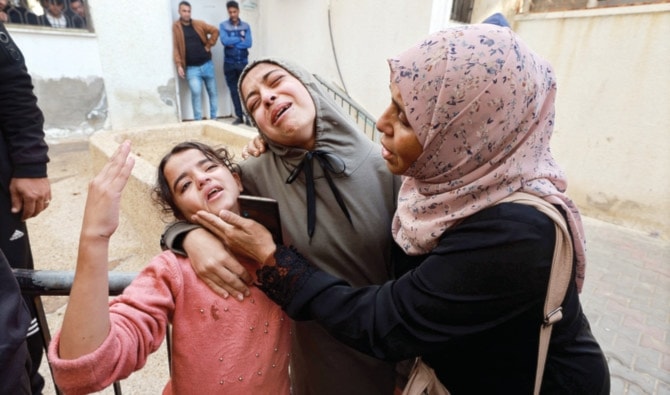'Israel' killing 63 Palestinian women a day, half being mothers: UN
Eighty-four percent of Gaza's women indicated that no less than one of their family members was forced to miss meals in the previous week with mothers missing the meals in 95% of the cases.
-

Family members mourn a baby girl in the courtyard of Al-Najjar Hospital in December 2023 killed in an Israeli strike in Rafah in the southern Gaza Strip. (AFP)
According to a press release by UN Women, the Israeli occupation has killed more than 9,000 women in the besieged Strip.
On the 148th day of the Israeli aggression on Gaza, the Gaza Ministry of Health reported 10 massacres against families in the region. The tragic toll includes 92 martyrs and 156 injuries in 24 hours only.
Compounding the devastation, some victims are still trapped under rubble and on roads, with the Israeli occupation hindering the arrival of ambulance and civil defense teams.
The Israeli aggression has so far killed a total of 30,320 Palestinians and resulted in 71,533 injuries since October 7.
The war on Gaza is estimated to be killing an average of 63 Palestinian women a day, half of whom are mothers.
According to the UN, more than four out of five women (84 percent) say that their family consumes half or less of what they did before the war, with mothers and adult women charged with procuring food while "eating last, less, and least than everyone else."
Eighty-four percent of Gaza's women indicated that at least one of their family members was forced to miss meals in the previous week, with mothers missing the meals 95% of the time.
The women's group stated that Gaza's entire population of 2.3 million people would face acute food insecurity within weeks, the largest ever recorded as Gaza is on the point of famine.
Ten of the twelve women's groups questioned in Gaza by UN Women reported being only partially functioning, delivering critical emergency response and assistance services via their remarkable efforts. The women's group stressed that sending funds to these groups was critical to meeting the tremendous needs of women, their families, and communities, as well as ensuring that the views of the women in Gaza views were heard.
In its press release, UN Women warned that "many more" women would die in the coming weeks if there was not an immediate ceasefire.
"The killing, bombing, and destruction of essential infrastructure in Gaza must stop. Humanitarian aid must get into and across Gaza immediately."
Maternity in crisis: 1 in 5 pregnant women in Gaza faces malnutrition
Doctors in Gaza have issued a warning that one out of every five pregnant women attending a prominent clinic in central Gaza is suffering from malnutrition. This revelation comes amid severe shortages of fuel and medical supplies due to the Israeli genocide and total blockade, causing the last functioning hospital in the northern part of the strip to shut down.
“Every day, we see women and children coming into our clinic suffering from acute malnutrition,” said Dr. Maram, the lead physician for Project Hope.
Every ten minutes, a pregnant woman in the #Gaza Strip gives birth under brutal circumstances, as thousands of other pregnant women in shelter centers and tents face the risk of contracting diseases, abortion, and even direct murder by Israeli forces.#PalestineGenocide pic.twitter.com/VO08sNUJ3S
— Al Mayadeen English (@MayadeenEnglish) February 14, 2024
In the three weeks leading up to February 24, a Deir al-Balah clinic in Gaza reported that 21% of pregnant women receiving treatment were identified as malnourished. Additionally, one in ten children examined at the clinic during the same period were found to be suffering from malnutrition, according to the nonprofit organization.
“As infectious diseases spread in cramped areas and food becomes even scarcer, we will see more and more people going hungry – including the health workers who are trying to help. I worry every day that I won’t find anything to eat,” Dr. Maram said.
Despite warnings from the UN about "pockets of famine" and widespread hunger in Gaza, the flow of aid to the Strip remains minimal. Shipments have decreased by approximately half compared to January levels, averaging fewer than 100 trucks per day or 2,300 for the entire month. This falls significantly short of the estimated requirement of 500 trucks daily to meet the basic needs of the population.

 4 Min Read
4 Min Read








